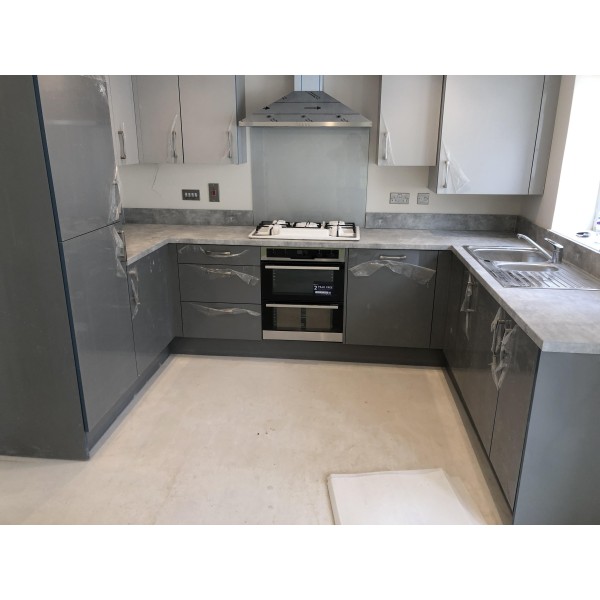Property Refurbishment in Rhondda
Search Property Refurbishment in places nearby
Understanding Property Refurbishment in Rhondda
Property refurbishment in Rhondda is an exciting venture that can breathe new life into homes and buildings. Whether you're a homeowner looking to enhance your living space or an investor aiming to increase property value, refurbishment offers a myriad of opportunities. This article delves into the various aspects of property refurbishment, providing insights and guidance for anyone interested in transforming properties in this charming Welsh region.
The Importance of Property Refurbishment
Refurbishing a property isn't just about aesthetics; it's about improving functionality, safety, and value. In Rhondda, where historical architecture meets modern needs, refurbishment plays a crucial role in preserving the character of buildings while adapting them for contemporary living. By investing in refurbishment, property owners can enhance energy efficiency, comply with safety regulations, and create a more comfortable environment.
Enhancing Property Value
One of the primary reasons people undertake property refurbishment in Rhondda is to boost the property's market value. A well-refurbished property attracts potential buyers and tenants, offering a higher return on investment. Upgrades such as modern kitchens, updated bathrooms, and energy-efficient systems can significantly increase a property's appeal and marketability.
Preserving Historical Charm
Rhondda is known for its rich history and unique architectural styles. Refurbishment allows property owners to preserve these historical elements while integrating modern amenities. This balance between old and new not only maintains the area's cultural heritage but also enhances the property's charm and character.
Planning Your Refurbishment Project
Embarking on a refurbishment project requires careful planning and consideration. From setting a budget to choosing the right contractors, each step is crucial to the project's success. Here's a comprehensive guide to help you navigate the planning process.
Setting a Realistic Budget
Before starting any refurbishment project, it's essential to establish a realistic budget. Consider all potential costs, including materials, labour, permits, and unexpected expenses. A well-defined budget helps prevent overspending and ensures that the project stays on track.
Choosing the Right Contractors
Selecting experienced and reputable contractors is vital for a successful refurbishment. Look for professionals with a proven track record in property refurbishment in Rhondda. Check references, read reviews, and ensure they have the necessary licenses and insurance. A reliable contractor will guide you through the process, offering expert advice and quality workmanship.
Obtaining Necessary Permits
Depending on the scope of your refurbishment project, you may need to obtain permits from local authorities. These permits ensure that the work complies with building codes and regulations. Failing to secure the necessary permits can lead to fines and delays, so it's crucial to address this aspect early in the planning stage.
Key Areas of Focus in Property Refurbishment
When refurbishing a property, certain areas require special attention to maximise the project's impact. Focusing on these key areas can significantly enhance the property's functionality and appeal.
Kitchen and Bathroom Upgrades
Kitchens and bathrooms are often the focal points of any refurbishment project. Modernising these spaces can dramatically improve the property's overall appeal. Consider installing energy-efficient appliances, updating fixtures, and using durable, stylish materials to create functional and attractive spaces.
Energy Efficiency Improvements
Improving energy efficiency is a top priority for many property owners. Upgrading insulation, windows, and heating systems can reduce energy consumption and lower utility bills. These improvements not only benefit the environment but also increase the property's value and appeal to eco-conscious buyers.
Structural Repairs and Safety Enhancements
Addressing structural issues and enhancing safety features are critical components of any refurbishment project. Ensure that the property's foundation, roof, and electrical systems are in good condition. Installing smoke detectors, carbon monoxide alarms, and security systems can further enhance the property's safety and security.
Overcoming Common Challenges in Refurbishment
Refurbishment projects can present various challenges, from unexpected costs to logistical hurdles. Understanding these potential obstacles and how to overcome them is essential for a smooth and successful project.
Managing Unexpected Costs
Unexpected costs are a common challenge in refurbishment projects. To mitigate this risk, include a contingency fund in your budget to cover unforeseen expenses. Regularly review the project's progress and financial status to identify and address any issues promptly.
Dealing with Delays
Delays can occur due to various factors, such as weather conditions, supply chain disruptions, or contractor availability. To minimise delays, establish a realistic timeline and maintain open communication with your contractors. Flexibility and proactive problem-solving can help keep the project on schedule.
Ensuring Quality Workmanship
Quality workmanship is crucial for a successful refurbishment. To ensure high standards, work closely with your contractors and conduct regular inspections. Address any concerns immediately and don't hesitate to seek a second opinion if necessary. A focus on quality will result in a durable and aesthetically pleasing property.
Legal Considerations in Property Refurbishment
Understanding the legal aspects of property refurbishment is essential to avoid potential pitfalls. From zoning laws to building codes, compliance with legal requirements is crucial for a successful project.
Understanding Zoning Laws
Zoning laws dictate how properties can be used and developed. Before starting a refurbishment project, ensure that your plans comply with local zoning regulations. This step is particularly important if you're considering significant changes to the property's structure or use.
Complying with Building Codes
Building codes set the standards for construction and refurbishment projects. These codes ensure that properties are safe, accessible, and energy-efficient. Familiarise yourself with the relevant building codes and work with your contractors to ensure compliance throughout the project.
Addressing Environmental Regulations
Environmental regulations may impact your refurbishment project, especially if it involves older properties with potential hazards like asbestos or lead paint. Conduct thorough inspections and address any environmental concerns to ensure the safety and compliance of your project.
Financing Your Refurbishment Project
Securing the necessary funds for your refurbishment project is a critical step in the planning process. Explore various financing options to find the best solution for your needs.
Exploring Loan Options
Several loan options are available for property refurbishment, including home improvement loans, personal loans, and equity release. Research each option to determine which best suits your financial situation and project requirements.
Utilising Government Grants
In some cases, government grants may be available to support refurbishment projects, particularly those focused on energy efficiency or historical preservation. Investigate potential grant opportunities and eligibility criteria to supplement your project's funding.
Budgeting for Long-Term Savings
While refurbishment projects require an initial investment, they can lead to long-term savings through reduced energy costs and increased property value. Consider the potential return on investment when planning your budget and financing strategy.
Frequently Asked Questions
- What is the average cost of property refurbishment in Rhondda? The cost varies depending on the project's scope, materials, and labour. On average, it can range from £20,000 to £100,000.
- How long does a typical refurbishment project take? The duration depends on the project's complexity. Simple renovations may take a few weeks, while extensive refurbishments can last several months.
- Do I need planning permission for refurbishment? It depends on the nature of the work. Structural changes or alterations to listed buildings may require planning permission.
- Can I live in my property during refurbishment? It depends on the extent of the work. For major renovations, it may be more practical to find temporary accommodation.
- How can I ensure my refurbishment is eco-friendly? Focus on energy-efficient upgrades, sustainable materials, and waste reduction practices to create an eco-friendly refurbishment.
- What should I look for in a refurbishment contractor? Look for experience, positive reviews, proper licensing, and a clear understanding of your project's requirements.
Final Thoughts on Property Refurbishment in Rhondda
Property refurbishment in Rhondda offers a unique opportunity to enhance the beauty and functionality of homes while preserving the area's rich heritage. By carefully planning your project, focusing on key areas, and addressing potential challenges, you can achieve a successful refurbishment that adds value and comfort to your property. With the right approach and resources, your refurbishment project can transform your property into a modern, efficient, and charming space that reflects the best of both past and present.














